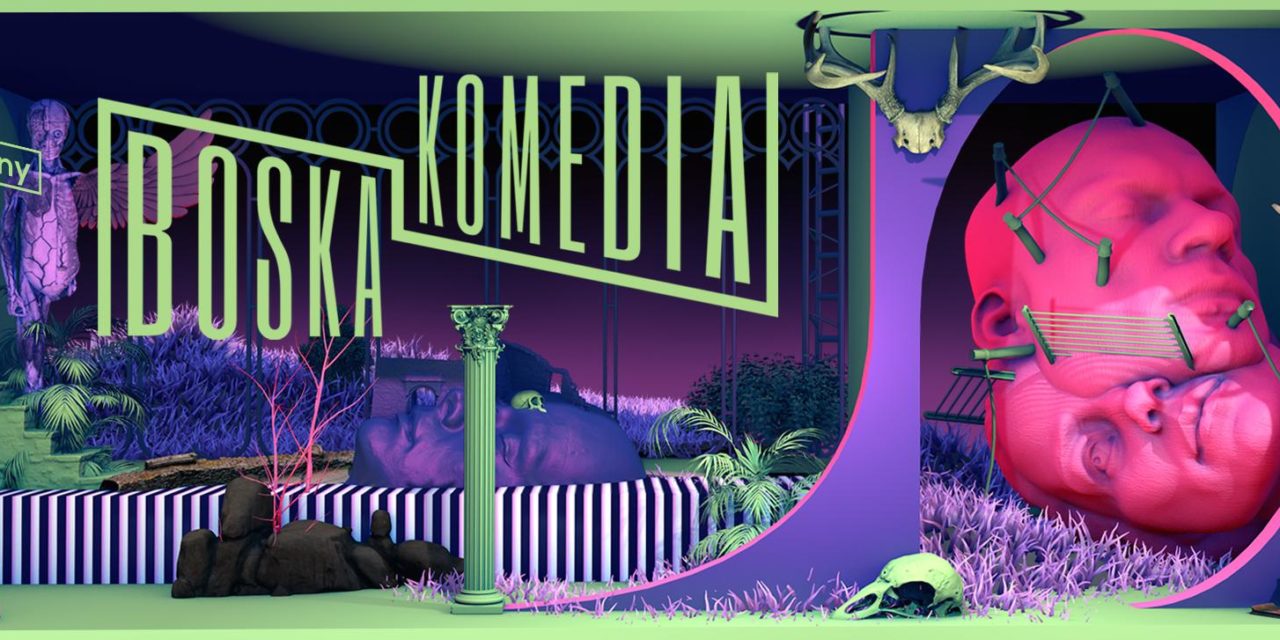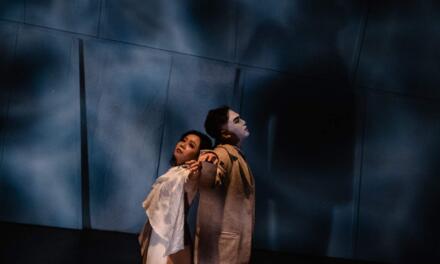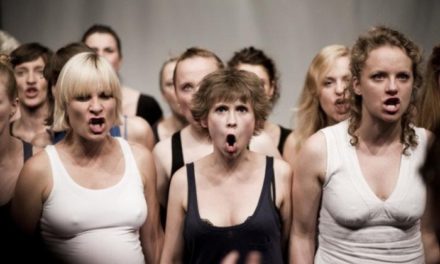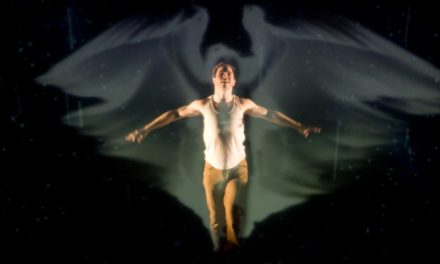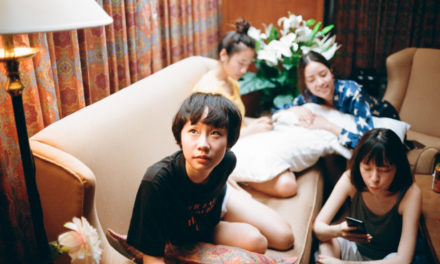The 11th iteration of the Boska Komedia (Divine Comedy, think Dante) International Theater festival, held from December 8th-16th in Kraków, Poland, was filled to the brim with bold ideas. Two fetuses (played by grown men) arguing in the womb? Check. A Three Sisters Olga dancing in a large samovar costume? Check. Screaming about infinity in a handmade clay pot in an adaptation of Aristophanes’ The Frogs? Check. check check.
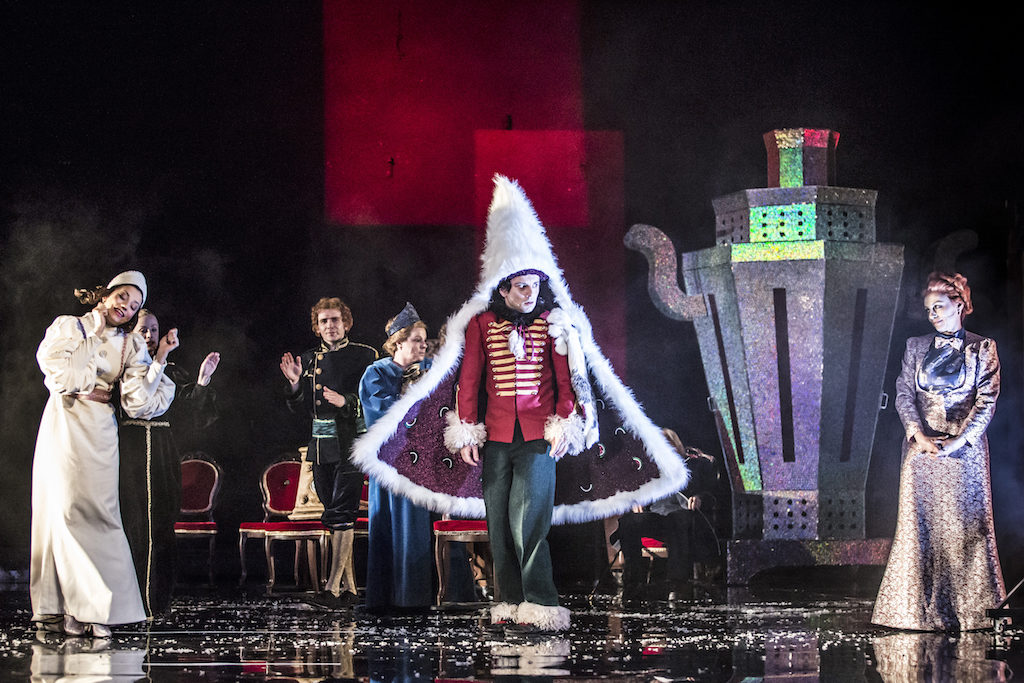
Three Sisters directed by Jędrzej Piaskowski. Presented at Teatr im. Juliusza Słowackiego — Duża Scena. for the 2018 Boska Komedia Festival. Produced by Teatr im. Juliusza Osterwy w Lublinie. Photo Credit: Natalia Kabanow
Hailed as the central event in the Polish theatrical calendar, Jacek Majchrowski, Mayor of Kraków, describes the festival as such:
“Divine Comedy is a festival born of love for the theatre…a place to attempt to assess the current condition of the Polish stage and consider its future.”
The mayor of Kraków likens this year’s festival to the 1967 song Dziwny jest ten świat [Strange is the World] by Polish singer Czesław Niemen. Yes. As strange as the sampling of plays described above are, how strange indeed has the world been this past year?
Keeping with its Alighierian namesake, the festival is split up into three categories: Inferno, Paradiso, and Purgatorio.
Inferno is the main event. The 13 plays that make up Inferno are not necessarily the best plays of the 2018 Polish season, but rather, according to the program: “the most extensively discussed productions….reflecting the creative temperature and aspirations of Polish Theatre artists.” These 13 plays are judged by an international, non-Polish jury of four with winners receiving awards and cash prizes.
“The main goal…is to emphasize the variety of Polish theatre and to acquaint the audience with the latest trends in staging and with the directors’ experiments.” (from the program)
For 2018, the awards are as follows…
Best Second Actress: Jadwiga Jankowska-Cieślak in We Are Leaving
Best Second Actor: Jan Sobolewski in The Frogs
Best Sound Design and Music: Paweł Mykietyn for We Are Leaving
Best Set and Costume Design: Małgorzata Szczęśniak for We Are Leaving
Best Actor: Szymon Czacki for The Conformist 2029
Best Actress: Sandra Korzeniak for Under the Influence and Krystyna Janda for Notes From Exile
Best Director: Michał Borczuch for The Frogs
Best Performance: Under the Influence and Notes From Exile
I wrote specific reviews for 5 of these 13 plays: The Conformist 2029, Under the Influence, Disgrace, We are Leaving, and Notes from Exile. I personally believe these five plays to be the strongest and most interesting of the festival. You can read those reviews by clicking here.
Briefly regarding a few other plays from Inferno…
1946, directed by Remigiusz Brzyk, relays the true (though somewhat unknown) story of a post-WII pogrom in the Polish town of Kielce which housed Jews who miraculously survived the Holocaust. The history was deeply interesting, but the dramatic structure was inconsistent. However, the play contained an impeccably poignant scene in which the actors as doctors are overwhelmed with the sheer number of patients entering their hospital, as historical images of the pogrom flash on a screen.
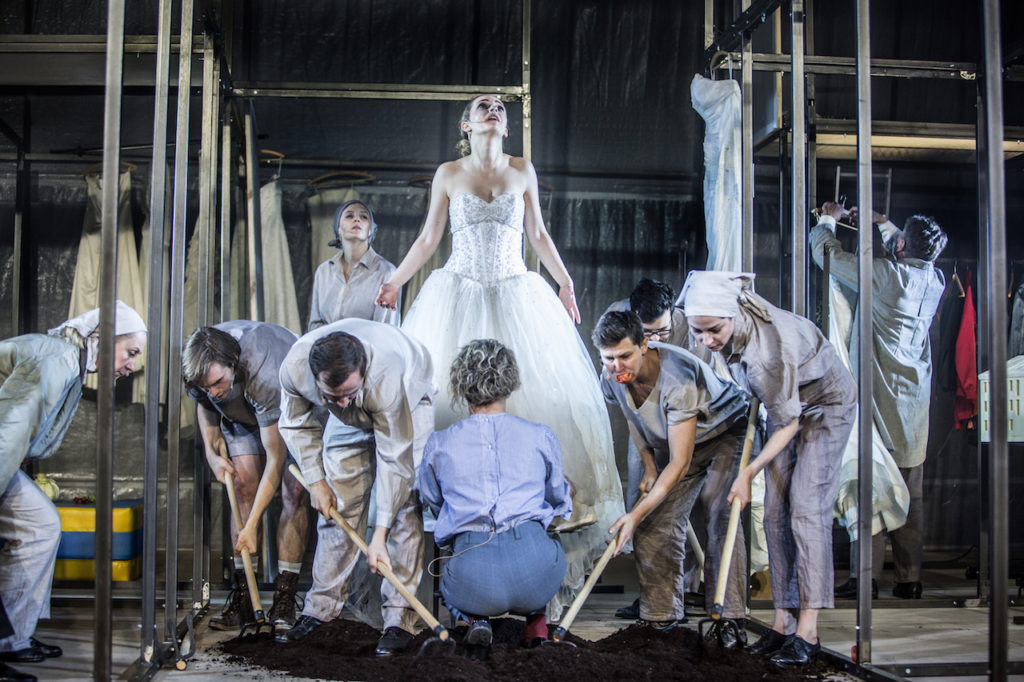
1946 directed by Remigiusz Brzyk. Presented at Narodowy Stary Teatr im. Heleny Modrzejewskiej w Krakowie — Scena Kameralna for the 2018 Boska Komedia Festival. Produced by Teatr im. Stefana Żeromskiego w Kielcach. Photo Credit: Natalia Kabanow
Wujaszek Wania [Uncle Vanya], directed by Iwan Wyrypajew, was wonderfully fast and charged. Although the play ultimately lacked depth, it was fun watching Wyrypajew play with naturalism as a form, complete with wonderfully large trees accented with misty fog and a Chekhovian gun that despite firing at point blank range twice cannot actually hurt anyone.
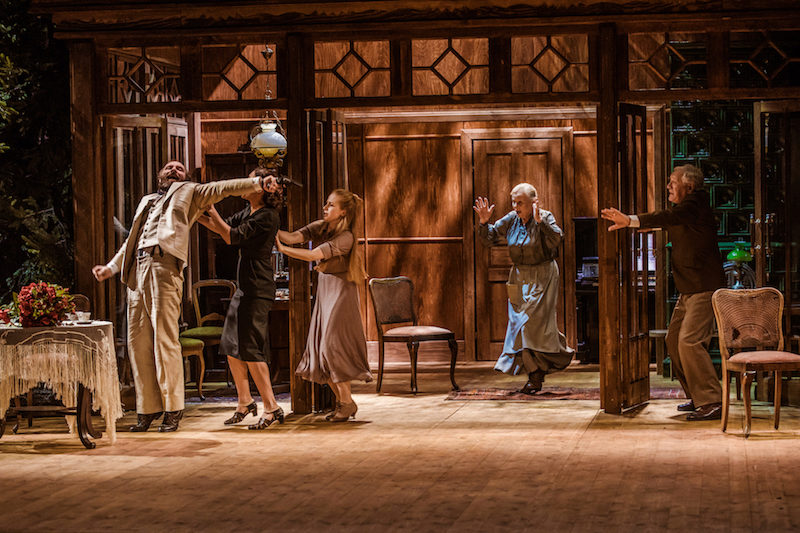
Uncle Vanya directed by Iwan Wyrypajew. Presented at Teatr im. Juliusza Słowackiego w Krakowie — Duża Scena for the 2018 Boska Komedia Festival. Produced by Teatr Polski im. Arnolda Szyfmana w Warszawie. Photo Credit: Katarzyna Chmura-Cegiełkowska
Żaby [Frogs], a very loose adaptation of Aristophanes’ play directed by Michał Borczuch, was a patchwork of semi-connected scenes, the majority of which related to sex and intimacy. The scenes dragged on longer than they needed to, but this slow pacing proved highly effective during a gorgeous moment in which the actors undulate and move like a human bridge/tunnel for several minutes on the sage. Michał Borczuch took home best director for his work.
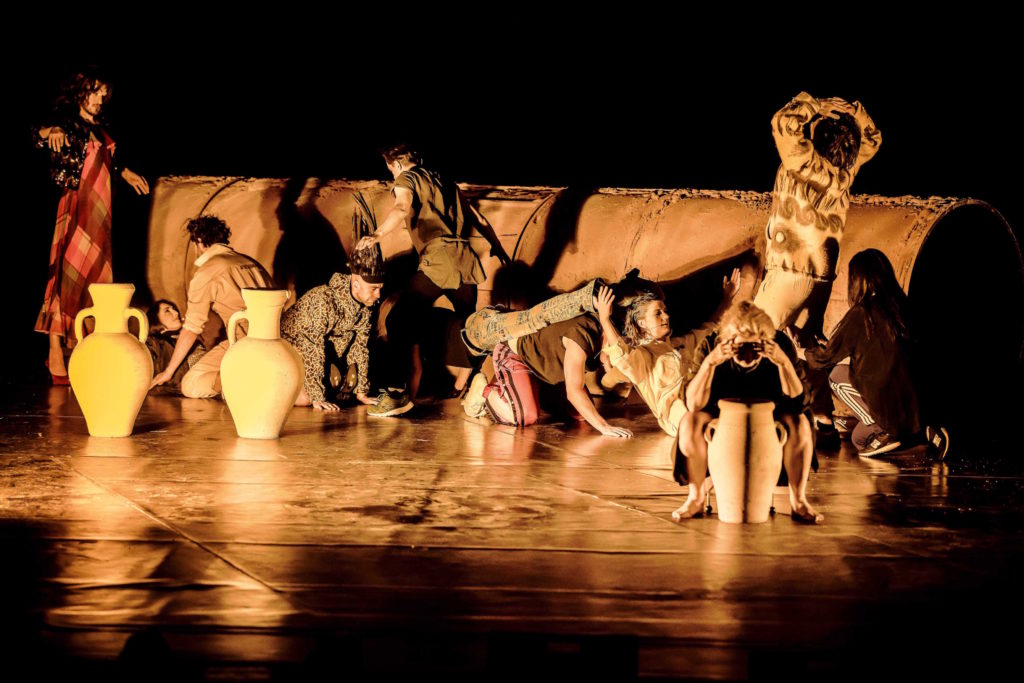
Frogs directed by Michał Borczuch. Presented at Narodowy Stary Teatr im. Heleny Modrzejewskiej w Krakowie — Scena Kameralna for the 2018 Boska Komedia Festival. Produced by STUDIO teatrgaleria. Photo Credit: Krzysztof Bieliński
Paradiso, subtitled “new energies” is an opportunity for emerging voices, talent, and artistry, particularly from those recently graduated from the Academy of Theater Arts in Kraków. One of these pieces was Strach [Fear] a dark horror piece that mostly featured goblin-like creatures moving around a large steaming hole to Hell. Certainly campy – Frankenstein’s monster makes a yelling appearance – but with occasional moments of profundity. A moment in which two of these pathetic Sméagol-like creatures embrace over fear for the each other’s respective death was particularly moving. I’m curious to see how the director, Małgorzata Wdowik, evolves, which seems to be exactly the purpose of Paradiso.
Purgatorio serves as an opportunity for all other kinds of drama and performance. One of these included Dom dźwięku [The House of Sound] directed by Wojtek Blecharz: an interactive piece in which each member of the audience is invited to a percussive instrument and instructed to play according to pre-written instructions, projections, and audio recordings. Later the audience partakes in a live survey using varying radio static as Yes/No/Maybe responses. The result of these happenings was a cacophonous beauty with larger reflections of sound as a whole.
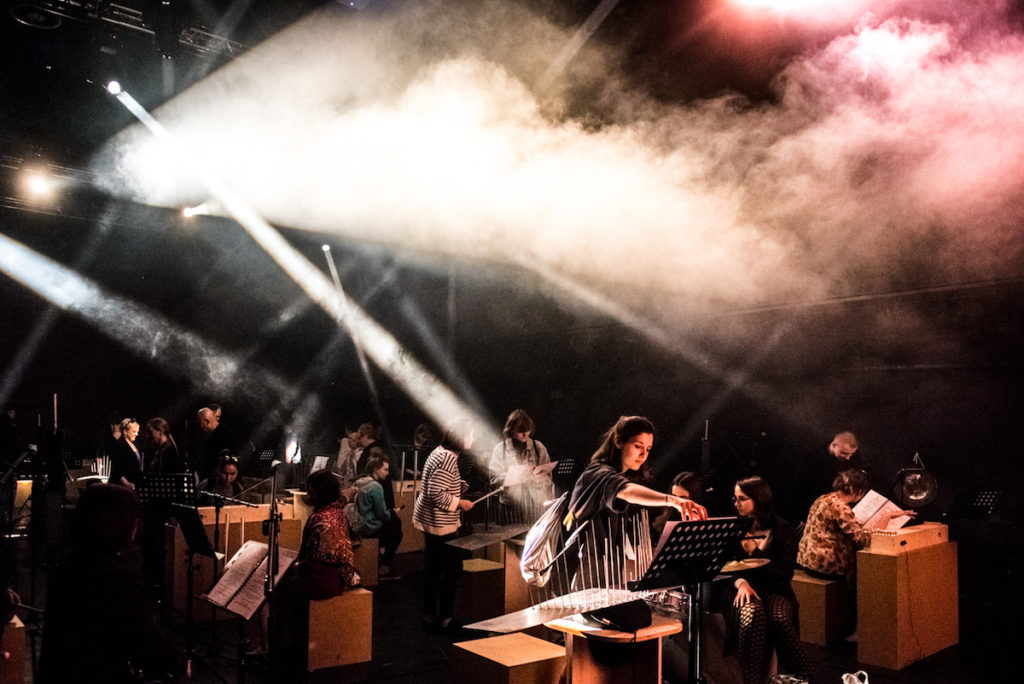
House of Sound directed by Wojtek Blecharz. Presented at MOS Małopolski Ogród Sztuki for the 2018 Boska Komedia Festival. Produced by Teatr im. Juliusza Słowackiego, Photo Credit: Monika Stolarska
Boska Komedia is well attended. Tickets sell out within hours for this international event, resulting in packed houses with several stragglers sitting in aisles. The Boska Komedia staff was also well organized and cordial. Due to shows running late and patrons rushing from theater to theater, the Boska Komedia team made sure to always hold the curtain for these groups of latecomers, while also ensuring folks were seated as quickly as possible.
The festival itself took place in 15 venues around Kraków. Some noteworthy theaters include the hundreds of years old Stary Theater, the new and quite large Łaźnia Nowa Theatre, and the gorgeously baroque Juliusz Słowacki Theatre.
Technology was an effective tool used in many of the plays, often enhancing the overall audience experience and in some cases, emphasizing the immediate presence of the live performance. The majority of the shows featured video and projection with one show, Disgrace, employing individual earpieces attached to radio for each audience member. Under the Influence was particularly effective with its large high definition film playing above its set at all times.
The plays ranged in issue, but all centered around the wants and needs of 2018. Given Poland’s (and the world’s) political climate, immigration, conformity, free-thought, antisemitism, and isolation all were recurring themes in this year’s festival. A few plays also directly or indirectly addressed the recent far-right rallies that took place in Poland.
This is, of course, the intent of the festival. While concerned for the rise of the worldwide denial and hatred, Bartosz Szydłowski writes in his program introduction that the festival is “an opportunity to bring the fundamental matters that concern people of the theater” while believing that “an eccentric gesture is capable of scattering the shades, and an unfettered imagination is the most beautiful way of reaching another human being.” I couldn’t agree more.
This special report from the 2018 Divine Comedy Festival in Poland was sponsored by the Adam Mickiewicz Institute and Emerson College. To read more reviews from the festival, click here.
This post was written by the author in their personal capacity.The opinions expressed in this article are the author’s own and do not reflect the view of The Theatre Times, their staff or collaborators.
This post was written by Rem Myers.
The views expressed here belong to the author and do not necessarily reflect our views and opinions.

